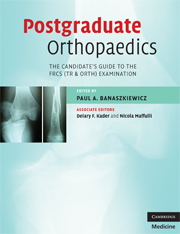Book contents
- Frontmatter
- Contents
- List of contributors
- Foreword by Mr Peter Gibson
- Preface
- Glossary
- Section 1 The FRCS (Tr & Orth) examination
- Section 2 The written paper
- Section 3 The clininicals
- Section 4 Adult elective orthopaedics oral
- Section 5 The hand oral
- 20 Syllabus and general guidance
- 21 Hand oral core topics
- Section 6 The paediatric oral
- Section 7 The trauma oral
- Section 8 The basic science oral
- Section 9 Miscellaneous topics
- Index
20 - Syllabus and general guidance
from Section 5 - The hand oral
Published online by Cambridge University Press: 22 August 2009
- Frontmatter
- Contents
- List of contributors
- Foreword by Mr Peter Gibson
- Preface
- Glossary
- Section 1 The FRCS (Tr & Orth) examination
- Section 2 The written paper
- Section 3 The clininicals
- Section 4 Adult elective orthopaedics oral
- Section 5 The hand oral
- 20 Syllabus and general guidance
- 21 Hand oral core topics
- Section 6 The paediatric oral
- Section 7 The trauma oral
- Section 8 The basic science oral
- Section 9 Miscellaneous topics
- Index
Summary
Hand surgery syllabus for the FRCS (Tr & Orth) examination
“The hand” covers the hand and forearm and the structures anatomically contained within. Knowledge of the structural anatomy and the biomechanics of joint and tendon function is required.
Pathology
A working knowledge of the acute conditions and trauma of the hand is required, i.e. injury to the bones, joints, tendons, nerves, skin and vessels of the hand and infective processes.
Knowledge of the non-acute congenital, degenerative, inflammatory (rheumatoid) and neoplastic conditions as well as benign tumours, e.g. ganglions, is also required.
Training in operative hand surgery
For the purpose of the examinations, the trainee should have gained experience in the operative management of:
The acutely injured hand
Fractures, including scaphoid non-union
Dislocations
Nerve injuries
Tendon injuries and common tendon transfers
Skin grafts
Infections
In elective surgery, the candidate must have sound knowledge of the procedures appropriate for carpal tunnel syndrome, trigger finger, Dupuytren's contracture, benign tumours, degenerative conditions of the carpometacarpal joint and wrist joints and surgery of the rheumatoid hand.
Long cases
Brachial plexus injuries
Peripheral nerve injuries
Rheumatoid shoulder/hand and wrist
Short cases
Brachial plexus lesions
Carpal instability
Carpal tunnel syndrome
Basal thumb osteoarthritis
Duplicated thumb
Dupuytren's disease
Kienböck's disease
Median nerve injury
Ulnar nerve injury (high and low)
Perilunate dislocation
Radial nerve palsy
Rheumatoid hand and wrist
Ulnar collateral ligament injuries
Basic science
APB wasting
Flexor tendon sheath/vinculae
Brachial plexus
[…]
- Type
- Chapter
- Information
- Postgraduate OrthopaedicsThe Candidate's Guide to the FRCS (TR & Orth) Examination, pp. 273 - 275Publisher: Cambridge University PressPrint publication year: 2008

